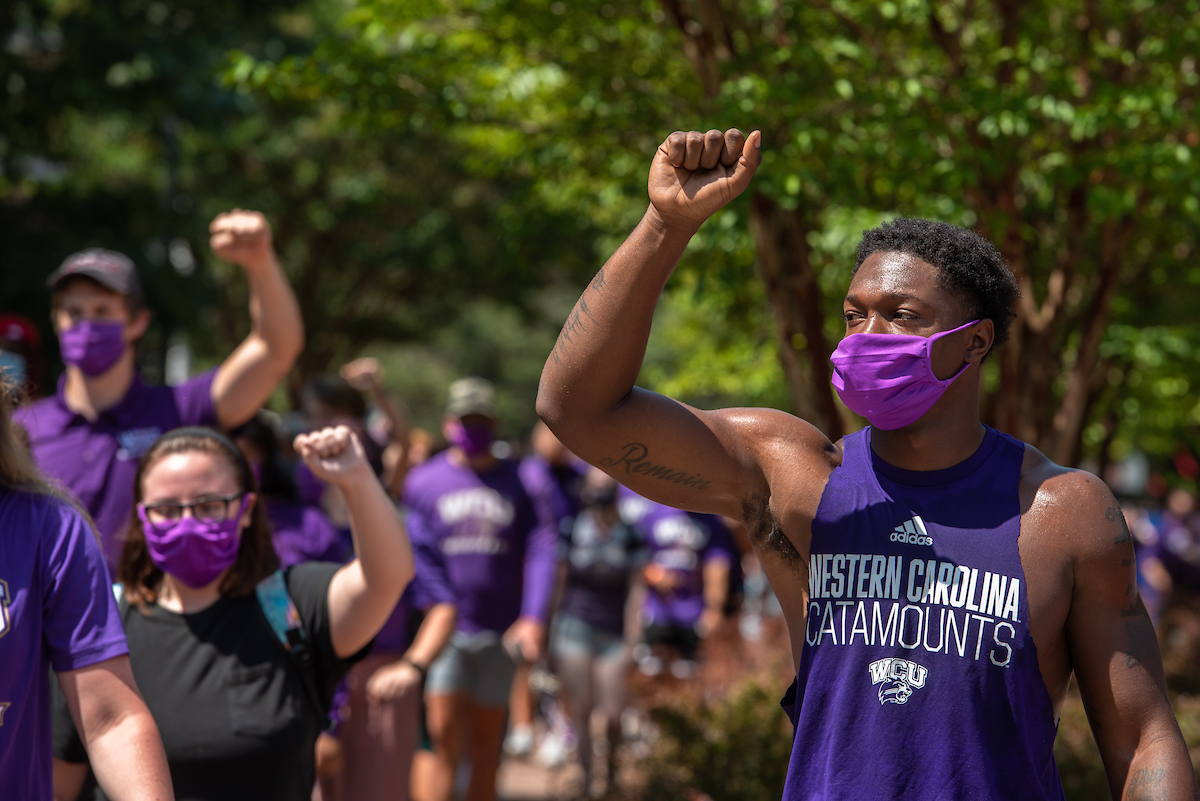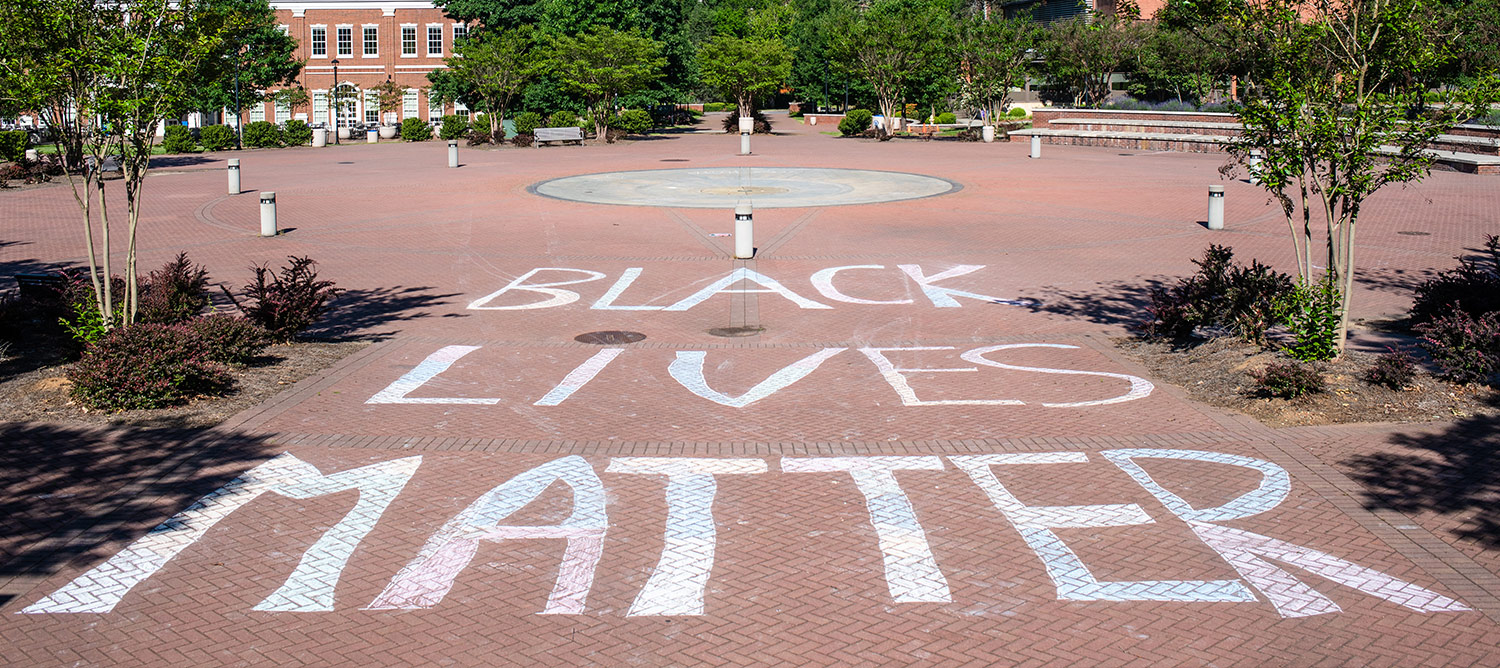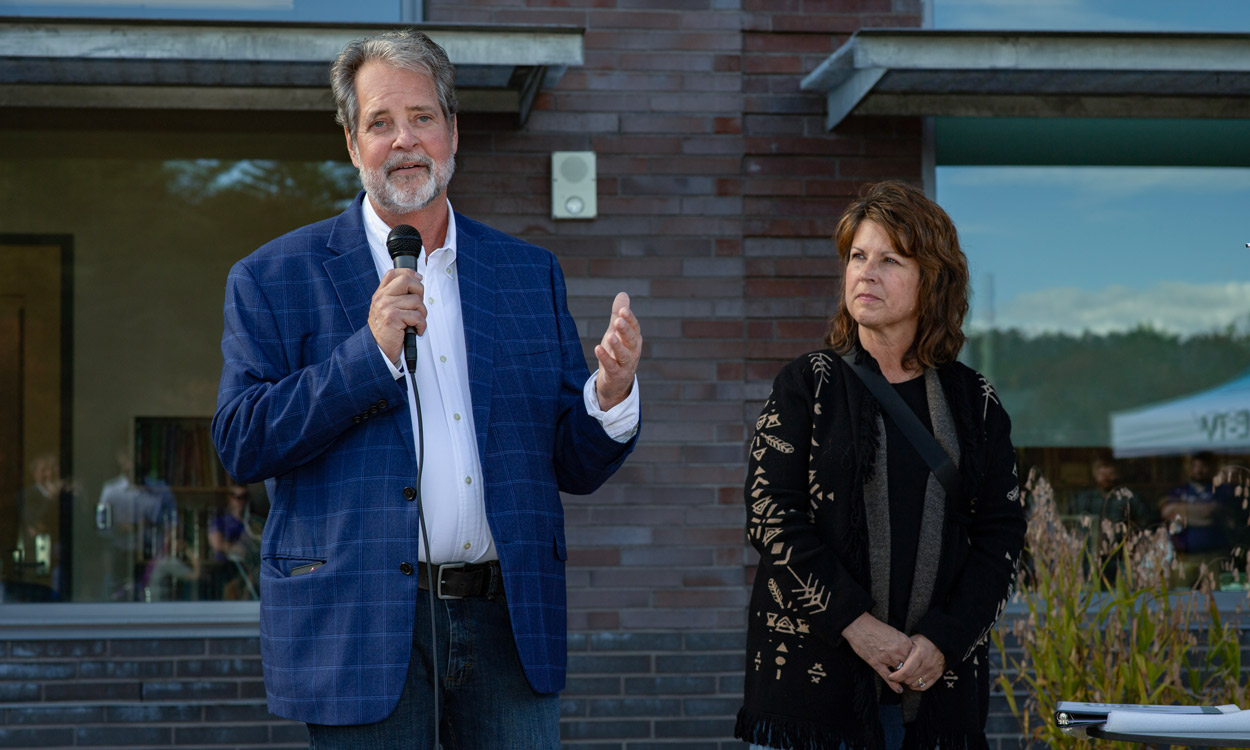












Winds of Change
In the midst of nationwide civil unrest, Western Carolina University renews its commitment to inclusive excellence
When Charity Leigh Moon Henry ’93 was studying theatre in the early 1990s, she had no inkling while on stage in what
was then called Hoey Auditorium that she was performing in a building named to honor
an individual who would have vehemently disapproved of her selection of a spouse and
denied their multiracial children enrollment at her alma mater. It was only after
Western Carolina University’s Board of Trustees unanimously agreed in June to change
the facility’s name that she learned the auditorium’s namesake, former N.C. Gov. Clyde Roark Hoey, was
a staunch segregationist.
“I was kind of shocked to find out all these years later that it was named after someone
who had that stance in the first place,” said Henry, whose African American husband
is a Georgia state trooper and whose daughter is enrolled at WCU this fall. “I understand
not wanting a building named after someone known for hate. The very place that should
be welcoming to all shouldn’t be named after someone who doesn’t hold those same values.”

Her daughter, WCU freshman Alexandria Henry, agreed. “From my experience of being
in theatre, it has brought so many people from all races together personally,” she
said. “The theatre was always a place people could go and know they weren’t alone.
They knew there were people backing them 24/7. I believe a place that holds such value
and love should have a name with the same values and respect.”
The removal of the Hoey name from the campus auditorium came during a summer of nationwide
civil unrest in the wake of the killings of several African Americans during interactions
with law enforcement. A tinderbox of anger and distrust was ignited by 8 minutes and
46 videotaped seconds of a police officer’s knee pressed into the neck of George Floyd,
resulting in his death.
"From my experience of being in theatre, it has brought so many people from all races together personally..."
Joseph Monroe ’99, a former Student Government Association president who acted in that auditorium as
part of WCU’s Black Theatre Ensemble, had two words in reaction to the name change
– what else? “I had to take classes as electives outside of my major just to be able
to say I had a professor of color during my college career,” said Monroe, who had
only two Black professors while studying at WCU.
“I appreciate WCU’s gesture to stand in solidarity and correct images, but I hope
it doesn’t stop with that. Students need to see faculty and staff who look like them.
Students need curriculum and activities that reflect their experiences. Students need
to know their voice matters,” Monroe said.


Chancellor Kelli R. Brown would agree with that sentiment. “Do I think that removing
the name of an avowed segregationist from a campus building will undo decades of racist
acts faced by members of the African American community? No, I do not,” Brown said.
“But, I do hope that it represents a small — but powerful — signal to our students,
faculty and staff of color that we support them and walk beside them as allies shining
a light on inequality and injustice.”
In addition to the action regarding the facility, rechristened University Auditorium,
Brown and Bryant Kinney ’82, trustees chair, addressed injustice and systemic racism during June’s meeting of
the board. “I believe that institutions of higher education have an obligation — a
sacred duty — to those who attend our places of learning and to our communities to
make sure we foster an environment that allows for open and honest dialogue, that
we encourage courageous conversations and that we serve as a place where people who
are different can come together and understand one another’s differences — and be
better for it,” Brown said.
In his comments, Kinney acknowledged that, as a white man, he has no personal comprehension
of being a Black American. “I don’t and can’t walk in the shoes of any man or woman
who faces the challenges of hate and fear that have been expressed over the past week
— or for that matter expressed for decades. What happened to George Floyd as simply
criminal and justice must be served, and not just for George Floyd but for the many
other tragic victims of racism and intolerance that sadly fill our airwaves and social
media feeds,” he said. “I know as a university, we have a strong commitment to diversity
and inclusion, and that will not waver. Key to that commitment is listening to voices
that come from those that feel they are not heard.”


It did not require the current cultural powder keg for Brown to realize the importance of improving the campus racial climate, however. She had identified enhancing the culture of diversity and inclusive excellence at WCU as a top priority in fall 2019. Earlier this year, she relocated Chief Diversity Officer Ricardo Nazario-Colón from the Division of Academic Affairs into the Chancellor’s Division.
“I made this change to send a signal, loudly and clearly, that diversity and inclusive excellence is an institutional priority of the highest level,” Brown said. “Diversity and inclusive excellence is not within the purview of just one person or one single unit of campus. Rather, this is a responsibility that is university-wide in scope.”
"If we want to move the needle, we need to engage in honest conversation about the role of culture”
Among Nazario-Colón’s responsibilities for fall is the formation of a blue-ribbon
panel to look at diversity and inclusion initiatives and activities WCU has undertaken
previously to examine what has worked well and what could work better, and to develop
new strategies. “I would like for the panel to help the campus see where the gaps
exist,” he said. “We have been working hard to provide training and engage in open
and direct conversations about diversity, equity and inclusion, but we have not blanketed
the campus.”
The elevation of the Equal Opportunity and Diversity Office to the Chancellor’s Division followed a 2018 revision of WCU’s strategic plan, titled
“2020 Vision: Focusing our Future.” The updated plan, designed to address changes
since the document was adopted in 2012 while remaining true to the direction of the
original, included a new strategic direction focused on inclusive excellence, with
issues of diversity and inclusion among the top topics heard in public feedback sessions.

“If we want to move the needle, we need to engage in honest conversation about the
role of culture,” Nazario-Colón said. “I hope the blue-ribbon panel can break the
proverbial glass ceiling on the culture conversation. If we are not willing to let
go of old notions about diversity, equity and inclusion, we will lag behind our peers.”
Part of the effort to move that needle is to increase diversity among faculty and
staff. Equal Employment Opportunity reports from WCU’s Office of Human Resources and
Payroll indicate progress has been made in that area. Minorities made up 10.2 percent
of the university’s total workforce in 2018, up from 6 percent in 2013, with increases
in the percentage of faculty and staff who self-reported as Black, Hispanic, Asian
or Native American; the increase for African Americans was modest, moving from 2.2
percent to 2.7 percent during that span. While these are positive steps, WCU can do
more by ensuring that matters related to diversity, equity and inclusion are baked
into every position as among the requirements to be considered “most qualified,” Nazario-Colón
said.

The university has had recent success hiring people of color into high-profile positions.
Former Catamount baseball player Alex Gary, senior associate athletics director for development at Oregon State University,
was named director of athletics in February. Gary is the first African American to lead the Catamount athletics program and the
first African American member of the chancellor’s Executive Council.
A month after taking office May 1, Gary issued a statement on behalf of the athletics
program in response to nationwide protests following the death of Floyd. “Racism and
social injustice are ugly parts of our country’s history and unfortunately are still
part of our country’s present,” he said. “Black lives more than matter; they are essential.”
Gary also announced four actionable initiatives designed to educate, empower and engage
all Catamount student-athletes.
Also on May 1, BaShaun Smith '20 became WCU’s dean of students after serving in that role in an interim
capacity since June 2019. The first African American in that position at WCU, Smith has found himself helping
students deal with two national issues — the impact of COVID-19 on higher education
and rising racial tensions. He was preparing over the summer to have difficult and
necessary conversations with all students following their return in the fall.

“We need to be able to have those conversations and to realize that we 100 percent
do not have to agree with each other, but we have to have a common ground of mutual
respect,” he said. “That’s the most difficult part because you have some folks saying,
‘Black lives matter,’ and some folks saying, ‘all lives matter.’” Smith acknowledges
the difficulty of finding the “common ground of mutual respect” because of the polarized
dialogue around race and social injustice. “We’re going to need a collective effort,
with staff and with our faculty all having the same message about how we work with
our students who are frustrated with what’s going on in our country, or maybe even
frustrated with what happened to them at the Sylva Walmart. We just need to be able
to support them and have those conversations early on, because I have no doubt that
it’s going to pick up soon.”
Among the reasons why Smith anticipates escalation of tensions is another heated election
season similar to what occurred in 2016. Then, as now, police shootings of Black men
combined with a contentious presidential campaign led to an increase of protests and
cries for social justice nationally and locally. Campus sidewalk chalk messages in
support of the Black Lives Matter movement were met with statements of support for
law enforcement via social media, as well as racially insensitive — sometimes flat-out
racist — posts.
Smith’s concerns about rising strife were realized just one week into the fall 2020
semester when a pair of videos containing racial slurs blew up on social media, prompting
swift condemnation from university leadership and a pledge to take active steps to
address the incidents consistent with WCU processes and policies. Members of the Catamount
football team paused athletics activities for several days and organized a unity march
attended by approximately 400 people. In July, five Black alumni from the School of
Art and Design participated in the painting of a Black Lives Matter street mural in
downtown Asheville, a project coordinated by the Asheville Area Arts Council with
former WCU faculty member Marie Cochran among the leaders.


In 2018, African American students participating in the annual Martin Luther King
Jr. Unity March were subjected to racial slurs shouted from residence hall windows,
followed by another incident when a slur was directed toward students walking near
Hunter Library. Those acts led to a group of concerned students known as “Whee Matter”
developing a list of expectations titled “The Collective Response to Racial Insensitivity,”
which called for action by various units of the university to help improve the campus
climate.
The list of expectations included, among other things, development of a mandatory
cultural awareness course for all new undergraduate students; changes to the Student
Government Association constitution and bylaws to create a director of diversity and
inclusive excellence position within SGA; an update of the Community Creed to clarify
that WCU does not tolerate bigotry; and creation of a bias-reporting processes. Those
requested changes have been implemented.

The students also asked administrators to add a new minor in African American studies
to the curriculum. That expectation moved closer to reality with the appointment of David Walton as director of African American studies, effective Aug. 1. Walton, who comes to WCU from the University of North Carolina
at Pembroke, is working to develop the program, which will begin offering classes
during the 2021-2022 academic year and complements a U.S. Latinx studies minor that began in fall 2019.
Walton’s ultimate goal is to have North Carolina’s leading African American studies
program located at WCU. “I want to create a pipeline out of Western Carolina for those
interested in pursuing a graduate-level degree in Black studies,” Walton said. “I
want kids in high schools in North Carolina who say ‘I want to get a degree in Black
studies’ to say ‘I’ve got to go to Western Carolina because there’s no other place
to go.’”
For Brittney Windham, president of the Black Student Union, the university has been doing a good job so far on changing the campus climate,
but she adds there is room for improvement. “I truly appreciate the fact that Chancellor
Brown reached out to me and asked what she can do to better assist the Black student
population on campus,” Windham said.

“The communication between student leaders of underrepresented communities on campus,
upper administration, and faculty and staff has been impressive. I am very proud of
them for taking the much-needed steps to make us feel seen, heard and welcome. I truly
believe that they are moving in the right direction, but only time will tell what
the future holds, and I just hope their future actions will match their present words,”
she said.
As does Monroe, the former SGA president who once performed in an auditorium once
named Hoey. “I want to see more meaningful changes so that when my son is college-hunting
in two years, WCU makes his list not just because I am an alumnus but because he will
be able to get everything he needs academically and get the experiences he needs to
be a successful contributor to this crazy world we live in,” he said.

